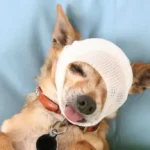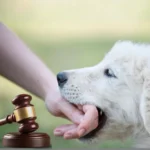
Why do dogs eat grass? Should you let them? Dogs love to eat! Whether it’s leftover crumbs, plastic wrappers, or even bits of fabric and dirt, they will munch on just about anything. But one curious habit many dogs have is eating grass.
Now, are you wondering, “Why do my dogs eat grass?” That’s what we are going to discuss in this article.
Why Do Dogs Eat Grass?

Many theories exist about why dogs eat grass. Some people think they do it to make themselves vomit if they’ve eaten something bad.
Others believe it indicates stomach issues or a need for certain nutrients or fiber.
But what’s the actual reason behind – why do dog eat grass?
Here are the 9 reasons why:
1. They have a nutritional deficiency
Some dog owners and vets think that dogs eating grass could be a type of pica. It is a condition where animals consume non-food items. This might happen due to nutritional deficiencies, lacking essential vitamins or minerals in their diet.
If your dog regularly eats grass, it could signal a diet issue. Consider consulting your vet about changing your dog’s food to ensure they get all the nutrients they need.
2. It is an instinctual behavior
If a dog’s diet is complete and balanced, eating grass might not be due to a deficiency but rather instinct. Dogs’ digestive systems and dietary needs have adapted to domestication.
While wild dogs didn’t rely on grass for nutrients, their diets from hunting whole animals, which may have consumed plants, were optimal. So, craving grass could be a natural instinct rooted in their genetic makeup from their hunting past.
3. They have an upset stomach
Dogs may eat grass when they have a stomach upset or inflammation. For some dogs, it’s instinctual to eat grass to induce vomiting.
In a study, one group of dogs was fed a diet with fructooligosaccharide (FOS), while another had a standard diet. FOS, derived from sugar beets, passes through the small intestines into the large intestine, where it ferments.
Large amounts of FOS can cause loose stool. Surprisingly, dogs with diarrhea from the FOS diet ate less grass than those on standard diets.
4. It is a normal dog behavior
Researchers discovered that a dog’s hunger level and the time of day affected their grass-eating behavior. Dogs ate less grass after a meal and more before it.
Additionally, grass-eating decreased as the day progressed. The researchers concluded that eating grass was a normal behavior for dogs and didn’t necessarily signal any sickness.
5. They want more fiber
Dogs might naturally eat grass if their diet lacks enough fiber. Research indicates that adult dogs should have up to 50% of their diet consisting of carbohydrates, including 2.5% to 4.5% from fiber.
Additionally, a minimum of about 5.5% of their diet should be fats, and 10% should be protein. VCA Animal Hospitals suggests that dogs need fiber to digest food properly and maintain regular bowel movements. Grass, being rich in fiber, can aid in this process.
6. They are bored and want your attention
Dogs may chew and eat grass because they’re bored or seeking attention from their owners. Just because a dog chews grass doesn’t always mean they have a stomach issue. Some dogs simply do it out of boredom.
Additionally, dogs are intelligent creatures. If they realize they get more attention from their owner when they eat grass, they may continue the behavior to seek even more attention.
7. Your dog enjoys eating grass
Some dogs just like the taste or feel of fresh grass. Especially young, spring grasses can be appealing to them. It might occur seasonally, without any harm to your dog, and not persist for long. Additionally, your dog might enjoy the moisture from dew-coated grass.
8. They are anxious
Some dogs may resort to eating grass as a way to cope with anxiety or as a self-soothing behavior. A medical study found that around three-fourths of dogs that eat grass show some form of problematic behavior.
9. Your dog is simply curious
Dogs, especially puppies, tend to explore using their mouths. Eating grass might just be something they experiment with, similar to how some children eat dirt. Some dogs might even develop a liking for the taste of grass.
Why Do Dogs Eat Grass When Sick?
As we have discussed above, dogs can eat grass for several reasons.
But why do dogs sometimes eat grass when they are sick?
They do it to help soothe their stomach. Grass can make them throw up, getting rid of anything that’s bothering their tummy. It’s like a natural remedy for them.
Also, when they’re not feeling well, they might be trying to find something to help them feel better, and grass is just what they find. It’s like how humans might drink ginger ale when they have a stomach ache.
So, when your pup munches on grass, it’s often their way of trying to settle their upset stomach and feel a bit more comfortable.
Why Do Dogs Eat Grass And Vomit?

When dogs eat grass, they often vomit afterward. You can clearly see the undigested grass when they throw up.
But why do dogs eat grass and then throw up?
They do it because it can help them feel better when their stomachs are upset. Grass might tickle their throat or make them throw up, which can relieve any discomfort.
Sometimes, they just need to get rid of something that’s bothering them. So, munching on grass is like a way for them to self-medicate.
Why Do Dogs Eat Poop And Grass?

Dogs often eat grass along with other inedible items like dirt, plastic, and even poop. Disgusting right? But it is pretty common.
So, why do dogs eat grass sometimes, along with poop?
They can do it for various reasons. Eating poop is known as coprophagia. It can be due to,
- Curiosity
- Hunger
- Boredom
Some experts believe it could stem from dietary deficiencies or learned behaviors. Grass consumption, on the other hand, is often instinctive.
While these behaviors can seem unpleasant to us, they’re usually harmless. However, if excessive or causing health issues, it’s best to consult a veterinarian.
Is Eating Grass Bad for Dogs?
Usually, your dog eating grass isn’t a big worry. However, it’s wise to keep an eye on it. Experts advise that while grass-eating doesn’t usually harm dogs, it’s smart to check for any underlying health issues.
Where and when your dog munches on grass matters. Grass treated with chemicals harms dogs, and eating it can transmit intestinal parasites like roundworms.
If your dog eats grass excessively, watch for signs like,
- Vomiting
- Lethargy
- Weight loss
- Diarrhea
- Decreased appetite
- Lip licking
- Bloody stool
Your vet might check for parasites or toxicity if concerned. Monitoring your dog’s grass-eating habits helps catch any underlying health issues early.
Effects of Excessive Grass Eating on Dogs
Eating grass isn’t usually harmful to dogs, but there are some potential effects owners should watch for:
1. Gastrointestinal irritation
Eating too much grass can lead to gastroenteritis. It can cause symptoms like gas, stomach pain, bloating, diarrhea, and vomiting.
2. Intestinal blockage
Though rare, excessive grass consumption can cause blockages or constipation. It can lead to life-threatening situations if the intestines become completely obstructed.
3. Allergic reactions
Some dogs may be allergic to grass, showing signs such as skin inflammation, swelling, and itching in the ears and eyes.
4. Parasite infection
Continuously eating grass in an infected area might expose your dog to parasites, even if they receive regular deworming medication.
Tips to Stop Your Dog from Eating Grass

To help your dog stop eating grass, you can:
1. Improve their diet
Give your dog a balanced diet. Adding whole food supplements with minerals like manganese, magnesium, and calcium can help.
2. Treat medical conditions
Address any underlying medical issues causing grass-eating by consulting a vet.
3. Limit grass access
Walk your dog on a leash in areas with minimal grass to prevent them from eating it.
4. Increase fiber
If your dog lacks fiber, they may turn to grass. Adding fiber-rich foods like psyllium husk can make them feel fuller, reducing grass eating.
5. Designate a grazing area
If your dog enjoys grass but is healthy, create a safe, chemical-free area where they can graze.
6. Consider a basket muzzle
In severe cases, a basket muzzle can prevent grass consumption during walks while allowing normal activities like breathing and licking.
FAQs
It’s generally safe, but keep an eye on them for any problems.
Offer safe chew toys or distractions as an alternative.
Yes, dogs may eat grass if they have worms as a way to ease the discomfort.
About 70 to 80% of dogs eat grass at some point.
Wrapping Up
So, why do dogs eat grass? They do it for different reasons, like boredom or lacking certain nutrients. Usually, it’s not a big worry, but watch out for signs like upset stomach or allergies. If you’re worried about your dog eating grass, talk to your vet for guidance.
Explore Further:











